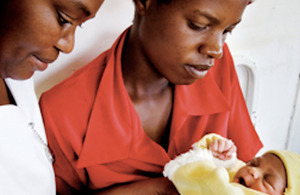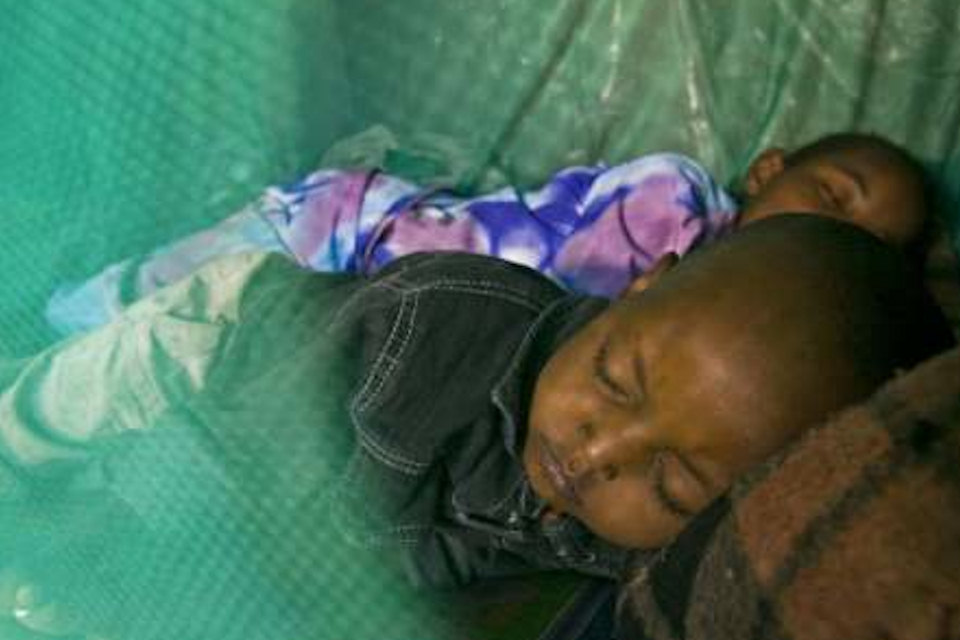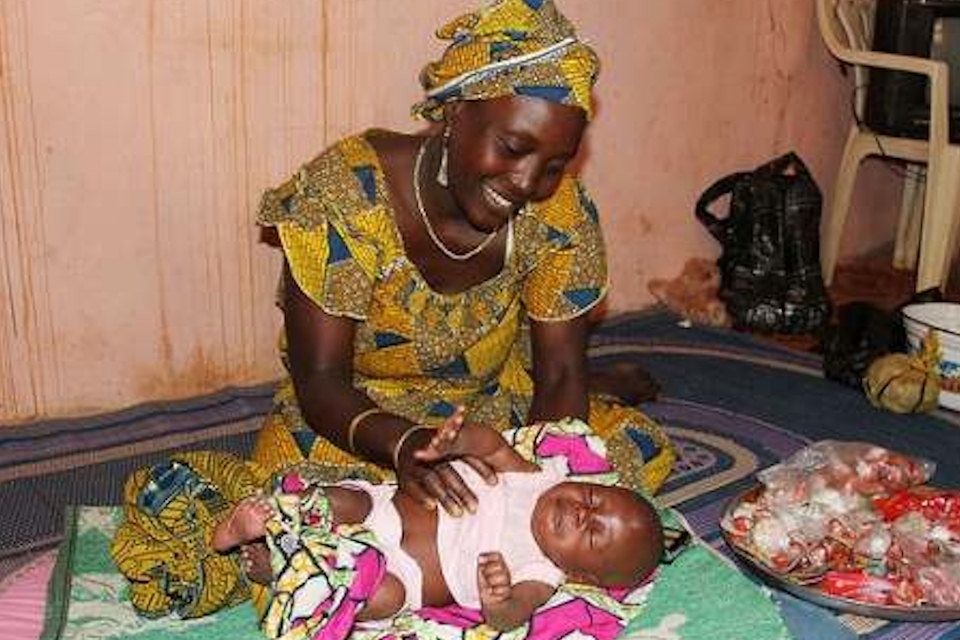DFID Research: Evidence Papers - Britain's plan to prevent malaria and save women's lives
Tackling malaria during pregnancy and childbirth could save many lives as a result of new plans revealed by the UK government

Nurse with mother and baby. Picture: Zimbabwe Elizabeth Glaser Pediatric AIDS Foundation
The UK government unveiled landmark plans on the eve of 2011 to tackle malaria and prevent deaths during pregnancy and childbirth in a move that could save an unprecedented number of lives.
The first of two new Frameworks for Results Breaking the Cycle: Saving Lives and Protecting the Future provides a comprehensive strategy for how British aid money will deliver the Coalition government’s commitments to help halve malaria deaths in at least ten hot spots in Africa and Asia.
The second Framework Choices for women: planned pregnancies, safe births and healthy newborns sets out how the UK will help to save the lives of at least 50,000 women and 250,000 newborns and enable at least 10 million couples to access family planning over the next five years.
Research and Evidence
Both frameworks are informed by evidence. The UK government has compiled a malaria evidence overview paper and a series of evidence papers for reproductive, maternal and newborn health that will be published throughout 2011. The papers are aimed at informing the design and implementation of the frameworks, but have been made available publically in case they are useful to others.
Give us your feedback
The evidence papers are working papers and will be updated periodically to include significant new published research, further research synthesis within DFID, and user feedback. Readers can email feedback to either [email protected] or [email protected] so that we can consider these views when updating the paper.
Background
The frameworks mark the biggest focus in recent British history on saving the lives of women and babies and the prevention of malaria deaths across the developing world. Both issues will be made a key priority across Britain’s overseas aid programmes.
Fragile and conflict countries, often neglected because they are difficult to work in, will receive an increase in support. Up to a third of malaria deaths and more than 50% of maternal deaths occur in these countries.
International Development Secretary Andrew Mitchell said: Every day over 2,000 people die from malaria and almost a 1,000 women die during pregnancy or childbirth. These deaths are all the more tragic because the vast majority could have been prevented.
“We will be relentless in driving down this terrible loss of life by hugely increasing our efforts, basing our actions on evidence; reaching more people with the right interventions; and by putting girls and women front and centre of our development work
Britain has a proud history of helping those in need. We are making our support go further by shifting the development agenda to one of accountability, impact and innovation - starting with malaria and maternal health.”
Reacting to the news of the frameworks, Melinda Gates, co - chair of the Bill & Melinda Gates Foundation said: “Investing in simple, inexpensive and proven interventions that will save the lives of women and children in developing countries is one of the best investments the UK can make. We’re pleased to partner with DFID and others to scale up these interventions and develop new ones that will multiply the UK’s efforts and its overall impact.”
“The world knows how to defeat malaria,” she added. “Huge progress has been made in recent years. The UK is smart to increase its investment to stop malaria deaths, to scale up this success, as well as to invest in new research which could one day eliminate malaria completely.”
Malaria

Closeup of Children Sleeping Under Net. Picture: Vergaard Frandsen
The malaria evidence overview paper provides a summary of current evidence in malaria, concentrating on those areas where policy or practical decisions will have to be made. For the most part written by staff members of DFID, with some sections authored by academic colleagues, the paper is primarily aimed at informing the design and implementation of the UK government’s malaria Framework for Results. It concentrates on regions where DFID has a major presence (primarily Africa and South Asia) and on areas of science with direct links to policy and practice decisions.
Although designed primarily to assist DFID and its partners, the Evidence Overview is also available publicly in case it is useful to others.
Please note that it is a working paper and it will be updated periodically to include significant new published research, further research synthesis within DFID, and user feedback. Recognising that many of the issues are context-specific, the paper will be supplemented by country profiles which will be available in early 2011.
Malaria - one of the major diseases of poverty - has a large evidence base and this evidence overview can only summarise this, although we have indicated major reviews and recent papers for those who want more detail.
Every effort has been made to give a fair and balanced summary, and the paper has been peer reviewed. For details of authors and peer reviewers, please see acknowledgements in the paper.
Inevitably, some judgements have to be subjective. If readers consider that the evidence on a particular issue is not accurately described or that important studies have been missed which would change the balance of evidence, please let us know so that we can consider these when updating the paper.
For further details on how the overview paper was constructed, please also refer to the foreword: what this paper is and is not.
Reproductive, Maternal and Newborn Health

Mother and baby. Picture: Lindsay Mgbor/DFID
The Reproductive, Maternal and Newborn Evidence Series provides an overview of relevant current evidence concentrating on those areas where policy or practical decisions will have to be made.
The series currently comprises:
- The Evidence towards MDG 5
- Burden, determinants & functioning health systems
- Interventions to reduce unintended pregnancy
- Private Sector Engagement in MNH/SRH
The series is primarily aimed at informing the design and implementation of the UK government’s Framework for Results.
It concentrates on regions where DFID has a major presence (primarily Africa and South Asia) and on areas with direct links to policy and practice decisions.
The scale of the task has required an incremental approach; with knowledge products made available at different times over the course of almost a year, as set out below.
Some of these are created using standard systematic review methods and others from structured literature reviews.
Although designed primarily to assist DFID and its partners the Evidence Series is also available publicly in case it is useful to others.
Please note that the structured reviews are working papers and will be updated periodically to include significant new published research, further research synthesis within DFID, and user feedback.
Every effort has been made to give a fair and balanced summary, but inevitably some judgements have to be subjective.
If readers consider that the evidence on a particular issue is not accurately described or that important studies have been missed which would change the balance of evidence, please let us know so that we can consider these when correcting or updating these papers.